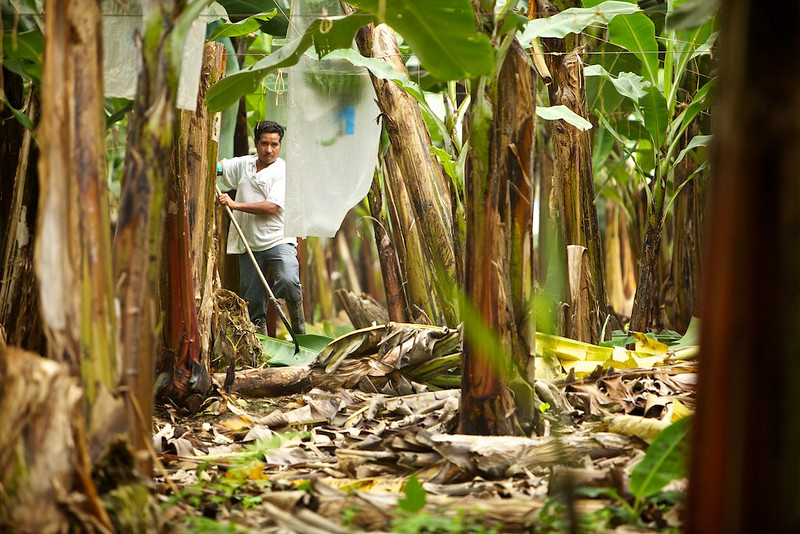Daniel Noboa, son of Ecuador’s wealthiest man and heir to a fortune built on bananas, won Ecuador’s presidential elections on Sunday, beating the left-wing candidate Luisa González by five points. Noboa took to the polling booths wearing a bullet-proof vest, in an indication of the level of violent crime that has recently shaken the nation, which is the largest exporter of bananas globally. In the run-up to an earlier round of inconclusive elections held in August, presidential candidate Fernando Villavicencio was assassinated.

Ecuador’s deepening crisis is linked to the country’s infiltration by criminal gangs. In August, Spanish authorities seized a record of 9.5 tonnes of cocaine hidden among bananas shipped from Ecuador. With a banana producing region that enjoys the ideal warm and humid conditions for banana production, Ecuador’s geographical location – sharing a border with Colombia and Peru – has also made the country vulnerable to exploitation by criminal gangs who see an opportunity to move their own illegal produce in the same shipping containers that bring bananas to consumers in Europe and North America. The country has experienced sharp rise in cases of extortion, and a homicide rate that is reported to have increased by 500% since 2016. Recently port workers were subject to extortion by criminal gangs, resulting in the delayed shipment of 400 containers of fruit, affecting the quality of the fruit and it’s profitability, due to the unforeseen costs associated with delay. A reported $100 million is spent every year to protect the country’s banana industry from security threats.
The targeting of banana shipments by criminal gangs came as a blow for the Ecuadorian banana industry, which has already had to deal with a series of crises over the last few years. Ecuador was one of the worst affected countries by Covid-19 – and banana producing region of Guayaquil was particularly badly affected. Following that, costs of production rose exponentially with the onset of Russia- Ukraine war, with some reporting a 60% increase in the cost of fertilisers in Ecuador last year. Coupled with rocketing freight costs and a scarcity of shipping containers, a significant fall was reported in banana exports to the European Union and United States last year. And this year, El Niño poses another threat to the industry, with some estimating that floods could damage over 100,000 hectares of farmland. In addition to the health-related, economic and climatic issues mentioned, Ecuador’s labour reputation has recently come under fire, with the country appearing for the first time this year in the list of the top ten worst countries for working people, partly due to barriers to trade union organising. Banana trade unionists are reportedly among those who have recently received death threats.
The banana industry’s woes are part of an escalating crisis that the Latin American country has been experiencing. While many make links between the deteriorating security situation in Ecuador and increasing violent crime on the one hand, and criminal activity related to drug trafficking on the other, the role of poverty has been underscored in a report by the UN Special Rapporteur Olivier De Schutter in August. De Schutter stated that he appreciated concerns about ‘…the deterioration of the security in the country, in which the homicide rate has been fast increasing, and which has witnessed a worrying rise of the role of drug traffickers.’ Referencing reports that 46% of people rural Ecuadorians now live in poverty, he went on to state ‘The response to this trend, however, cannot be solely to strengthen law enforcement. The need to tackle organized crime should not obfuscate the important links between socio-economic conditions and the rise of crime’.
In the midst of the volatile security situation, ordinary Ecuadorians have been living in a climate of fear and insecurity. Extortion is so commonplace that some businesses avoid handing out receipts in order to prevent their contact details falling into the wrong hands. Small businesses have been hit the hardest, with many unable to meet the requirement of paying thousands of dollars just to remain open. Some small banana producers have taken protective measures, hiring security guards or installing security cameras, but those in more remote locations lack access to the basic infrastructure to make this possible. And, while the big banana producers are also subject to extortion. ‘The difference is that they can pay, while the small producers cannot’, one representative of a small farmers organisation in El Oro tells us. In addition to the threat of extortion, there is concern over the possibility of contamination of banana shipments: ‘if their cargo is found to be contaminated, the shipment does not leave the port, and nobody takes responsibility for that loss. For small producers, this loss can mean that they are unable to continue growing bananas.’
Unfortunately, many small producers find that even meeting in groups now poses a heavy risk, preventing them from coordinating any response to these complex challenges. In addition, small producer’s organisations remain under-represented in international fora such as the World Banana Forum, with the requirement to pay membership fees and the costs of travelling to international meetings cited among the main barriers.
Looking to the future, one representative of small banana producers commented, ‘We hope that this new political administration will implement a model of participatory action, in which the state will involve the small producers’ associations that are suffering greatly at the moment, in the banana industry and beyond. As citizens we have different political inclinations, but we share one fundamental goal – survival and economic stability’.
